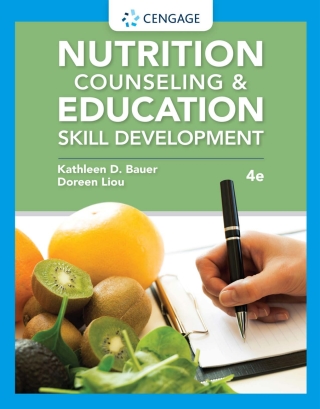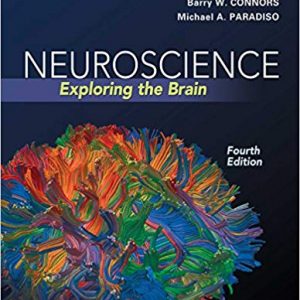Buy Nutrition Counseling and Education Skill Development, 4th Edition PDF ebook by author Kathleen D. Bauer; Doreen Liou – published by Cengage Learning in 2021 and save up to 80% compared to the print version of this textbook. With PDF version of this textbook, not only save you money, you can also highlight, add text, underline add post-it notes, bookmarks to pages, instantly search for the major terms or chapter titles, etc.
You can search our site for other versions of the Nutrition Counseling and Education Skill Development, 4th Edition PDF ebook. You can also search for others PDF ebooks from publisher Cengage Learning, as well as from your favorite authors. We have thousands of online textbooks and course materials (mostly in PDF) that you can download immediately after purchase.
Note: e-textBooks do not come with access codes, CDs/DVDs, workbooks, and other supplemental items.
eBook Details:
Full title: Nutrition Counseling and Education Skill Development, 4th Edition
Edition: 4th
Copyright year: 2021
Publisher: Cengage Learning
Author: Kathleen D. Bauer; Doreen Liou
ISBN: 9780357367797, 9780357367797
Format: PDF
Description of Nutrition Counseling and Education Skill Development, 4th Edition:
NUTRITION COUNSELING AND EDUCATION SKILL DEVELOPMENT helps entry-level nutritional professionals develop a solid foundation in counseling and education principles and evaluation methodologies. Taking a clear, engaging, step-by-step approach, the book includes case studies and first-person accounts and gives students opportunities in every chapter to practice new skills. Students learn to translate theoretical perspectives on nutrition counseling into effective dialogues that have the power to influence client knowledge, skills and attitudes.Important Notice: Media content referenced within the product description or the product text may not be available in the ebook version.
Table of Contents of Nutrition Counseling and Education Skill Development, 4th Edition PDF ebook:
ContentsPrefaceAcknowledgmentsAbout the AuthorsChapter 1: Preparing to Meet Your Clients1.1 Foundation of Nutrition Counseling and Education1.2 Fundamentals of Food Behavior1.3 Understanding an Effective Counseling RelationshipKey TermsReview QuestionsAsssignment: Build a CollageReferencesChapter 2: Frameworks for Understanding and Attaining Behavior Change2.1 Introduction2.2 Self-Efficacy2.3 Health Belief Model2.4 The Transtheoretical Model (Stages of Change)2.5 Using the Transtheoretical Model for Research and to Measure Outcomes2.6 Theory of Planned Behavior2.7 Social Cognitive Theory2.8 Cognitive-Behavioral Therapy2.9 Solution-Focused Therapy2.10 Client-Centered Counseling2.11 Motivational Interviewing2.12 Integrating Motivational Interviewing with Other Behavior Change Approaches2.13 Brief Encounters Using Motivational Interviewing2.14 Summary of Behavior Change AttributesKey TermsReview QuestionsAssignment: Observation of a Nutrition CounselorAdditional ResourcesReferencesChapter 3: Communication Essentials3.1 Nutrition Counseling Goals3.2 Stages of Skill Development3.3 Model of Communication3.4 Cultural Influence on Communication3.5 Guidelines for Enhancing Counseling Communication Effectiveness3.6 Empathy3.7 Basic Counseling ResponsesKey TermsReview QuestionsAssignment: Observation and Analysis of a Television InterviewAdditional ResourcesReferencesChapter 4: Meeting Your Client: The Counseling Interview4.1 Nutrition Counseling Models4.2 Nutrition Counseling Motivational Algorithm4.3 Assessing Readiness4.4 Nutrition Counseling Protocols: Analysis and Flow of a Counseling Interview and Counseling Sessi4.5 Involving Phase4.6 Exploration-Education Phase4.7 Resolving Phase4.8 Level 1: Not Ready to Change (Precontemplative)4.9 Level 2: Unsure, Low Confidence4.10 Level 3: Motivated, Confident, Ready4.11 FRAMES for Brief Interventions4.12 Considerations for Acute CareKey TermsReview QuestionsAssignment: Case Study AnalysisAdditional ResourcesReferencesChapter 5: Developing a Nutrition Care Plan: Putting It All Together5.1 Goal Setting5.2 Design a Plan of Action5.3 Dietary Assessment5.4 Energy Determinations5.5 Physical Assessments and Healthy Weight Standards5.6 Documentation and Charting5.7 Nutrition Care Process5.8 Step 4: Monitoring and Evaluation (M & E)Key TermsReview QuestionsAssignment: Nutritional AssessmentAdditional ResourcesReferencesChapter 6: Promoting Change to Facilitate Self-Management6.1 Strategies to Promote Change6.2 Food Management Tools6.3 Tracking6.4 Behavior Change Strategies6.5 Cognitive Restructuring6.6 Education during Counseling6.7 Supporting Self-ManagementKey TermsReview QuestionsAssignment: Food Management Tool UsageAdditional ResourcesReferencesChapter 7: Making Behavior Change Last7.1 Social Network7.2 Stress Management7.3 Sleep Counseling7.4 Mindful Eating7.5 Relapse Prevention7.6 Ending the Counseling Relationship7.7 Counseling Evaluation7.8 Evaluation of Counseling Effectiveness and SkillsKey TermsReview QuestionsAssignment: Identifying StressAdditional ResourcesReferencesChapter 8: Physical Activity8.1 Physical Activity Initiatives8.2 Role of Nutrition Counselor in Physical Activity Guidance8.3 Physical Activity and Fitness8.4 Physical Activity Goals8.5 Levels of Aerobic Physical Activity8.6 Barriers to Becoming Physically Active8.7 Physical Activity Counseling Protocols8.8 Assessments of Physical Activity8.9 Resolving Phase Protocols8.10 Issues Pertinent to Physical Activity Goal Setting and Action Plan DevelopmentKey TermsReview QuestionsAssignment: Physical Activity Assessment and CounselingAdditional ResourcesReferencesChapter 9: Communication with Diverse Population Groups9.1 Need for Cultural Competence9.2 Demographics-Population Trends9.3 Increased Use of Traditional Therapies9.4 Cultural Competence Models9.5 Guidelines for Delivering Cross Cultural Interviews and Interventions9.6 Cross-Cultural Nutrition Counseling Algorithm9.7 Working with Interpreters9.8 Life Span Communication and Intervention Essentials9.9 LGBTQ (Gay, Lesbian, Bisexual, Transgender, Queer) Population9.10 Eating Disorders9.11 Weight Bias9.12 Individuals with DisabilitiesKey TermsReview QuestionsAssignment: Conducting an Interview across CulturesAdditional ResourcesReferencesChapter 10: Group Facilitation and Counseling10.1 Communication Styles10.2 Using Questions in a Group10.3 Facilitating Groups10.4 Group Counseling10.5 Evaluation of Group InteractionsKey TermsReview QuestionsAssignment: Practice Group CounselingAdditional ResourcesReferencesChapter 11: Keys to Successful Nutrition Education Interventions11.1 Nutrition Education Settings11.2 Keys to Nutrition Education11.3 Keys to Success 1-Know Your Audience, Conduct a thorough Needs Assessment11.4 Data Collection Methods11.5 Keys to Success 2-Determine Your Educational Approach11.6 Keys to Success 3-Design Theory-Based Interventions11.7 Community Level and Planning Models: Social Marketing11.8 Keys to Success 4-Establish Goals and Objectives11.9 Generalizations11.10 Instructional PlanKey TermsReview QuestionsAssignment: Design a Nutrition Education InterventionAdditional ResourcesReferencesChapter 12: Educational Strategies, Technology, and Evaluation12.1 Keys to Success 5-Provide Instruction Planning and Incorporate Learning Strategies12.2 Keys to Success 6-Develop Appealing and Informative Mass Media Materials12.3 Keys to Success 7-Conduct EvaluationsKey TermsReview QuestionsAssignment: Develop a TV Public Service AnnouncementAdditional ResourcesReferencesChapter 13: Professionalism and Final Issues13.1 Professionalism13.2 Ethics13.3 Client Rights13.4 Boundary between Nutrition Counseling and Psychotherapy13.5 Starting a Private Practice13.6 Marketing Basics13.7 Telehealth and Telenutrition13.8 Self-CareKey TermsReview QuestionsAssignment: Evaluate Your Counseling EffectivenessAdditional Considerations of Videotape ObservationsAdditional ResourcesReferencesChapter 14: Guided Counseling Experience14.1 Developing a Counseling Style14.2 Finding Volunteer Clients14.3 Goals of the Guided Counseling Experience14.4 The Four Counseling SessionsKey TermsAppendicesAppendix A: DASH Food PlanAppendix B: Body Mass IndexAppendix C: Lifestyle Management FormsAppendix D: Dietary Reference Intakes (DRI)Index





